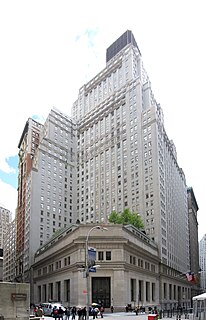Related Research Articles
Parens patriae is Latin for "parent of the nation". In law, it refers to the public policy power of the state to intervene against an abusive or negligent parent, legal guardian, or informal caretaker, and to act as the parent of any child, individual or animal who is in need of protection. For example, some children, incapacitated individuals, and disabled individuals lack parents who are able and willing to render adequate care, thus requiring state intervention.
The Northern Securities Company was a short-lived American railroad trust formed in 1901 by E. H. Harriman, James J. Hill, J.P. Morgan and their associates. The company controlled the Northern Pacific Railway; Great Northern Railway; Chicago, Burlington and Quincy Railroad; and other associated lines. It was capitalized at $400 million, and Hill served as president.
J.P. Morgan & Co. was a commercial and investment banking institution founded by J. P. Morgan in 1871. The company was a predecessor of three of the largest banking institutions in the world — JPMorgan Chase, Morgan Stanley, and Deutsche Bank — and was involved in the formation of Drexel Burnham Lambert. The company is sometimes referred to as the "House of Morgan" or simply "Morgan".

USF&G was an American insurance company that existed from 1896 until 1998. It was originally called the United States Fidelity and Guaranty Company. The insurer formed a holding company for its insurance businesses and changed its name to USF&G in July 1981.

Broad Street is a north–south street in the Financial District of Lower Manhattan in New York City. Originally the Broad Canal in New Amsterdam, it stretches from today's South Street to Wall Street.
Clearfield Trust Co. v. United States, 318 U.S. 363 (1943), was a case in which the Supreme Court of the United States held that federal negotiable instruments were governed by federal law, and thus the federal court had the authority to fashion a common law rule.

UGI Corporation is a natural gas and electric power distribution company headquartered in King of Prussia, Pennsylvania, with extensive operations in the United States and Europe.

20 Exchange Place is a skyscraper in the Financial District of Lower Manhattan in New York City. Completed in 1931, it was designed by Cross & Cross in the Art Deco style as the headquarters of the City Bank–Farmers Trust Company, predecessor of Citigroup. The building, standing at approximately 741 feet (226 m) with 57 usable stories, was one of the city's tallest buildings and the world's tallest stone-clad building at the time of its completion. While 20 Exchange Place was intended to be the world's tallest building at the time of its construction, the Great Depression resulted in the current scaled-back plan.
DataTreasury, located in Plano, Texas, United States, develops, acquires and licenses technology for secure check image capture and storage. As of 2010 the company had 2 employees, about 1000 shareholders and had generated over $350 million in licensing revenue in the previous four years.

23 Wall Street is an office building in the Financial District of Manhattan in New York City, at the southeast corner of Wall Street and Broad Street. The four-story building was designed by Trowbridge & Livingston in the classical style. Constructed between 1913 and 1914, it was originally the headquarters of J.P. Morgan & Co., later the Morgan Guaranty Trust Company.

Taylor, Bean & Whitaker was a top-10 wholesale mortgage lending firm in the United States, the fifth-largest issuer of Government National Mortgage Association securities. Their slogan was "Perfecting the Art of Mortgage Lending".

Guaranty Trust Bank PLC also known as GTBank or simply GTB is a Nigerian multinational financial institution, that offers online/internet banking, retail banking, corporate banking, investment banking and asset management services, with its head office in Victoria Island, Lagos.
Consolidated Indemnity and Insurance Company was a Hartford, Connecticut-based firm which became insolvent during the Great Depression. The corporation is important because it employed executives who were formerly directors of significant business concerns of New York City, in the early 1930s and before. Consolidated Indemnity and Insurance Company was organized in October 1928 with a capital of $2,500,000 and a surplus of $7,300,000. Among its fifteen directors were Saul Singer, vice-president of the New York Bank of the United States and C. Stanley Mitchell, president of the Central Mercantile Trust Company. Its president was John F. Gilchrist, chairman of the Tate Transit Commission. Gilchrist was a close personal and boyhood friend of Alfred E. Smith.
Gossard Limited is a Nottingham-based producer of women's undergarments and hosiery. Founded in the early 20th century in Chicago as H. W. Gossard Co., it expanded quickly, flourishing in the 1920s. As Associated Apparel Industries, Inc. it held a central position in its market in the 1930s. Amalgamated eventually succumbed to the poor economy in the United States during the Great Depression, but Gossard continues as a division of Courtaulds in Great Britain.
The Associated Telephone Utilities Company was a Wisconsin-based power company that went bankrupt in 1933, during the Great Depression. Prior to the Depression, the utility was a prominent player in the electrical power business in the Midwestern United States. An appeal by receivers appointed for the Associated Telephone Utilities Company was filed around April 1933, contesting the bankruptcy of the utility, and it was reorganized in 1934 as General Telephone. A chancellor in a court of chancery permitted the petition to be filed in United States District Court.

15 Broad Street is a former office building in the Financial District of Manhattan, New York City, on the eastern side of Broad Street between Wall Street and Exchange Place. It has entrances at 51 Exchange Place and 35 Wall Street.
The New York Trust Company was a large trust and wholesale-banking business that specialized in servicing large industrial accounts. It merged with the Chemical Corn Exchange Bank and eventually the merged entity became Chemical Bank.
The Clearing House is the parent organization of The Clearing House Payments Company. Other arms include the Clearing House Payments Authority and ECCHO.
Merrill, previously branded Merrill Lynch, is an American investing and wealth management division of Bank of America. Along with BofA Securities, the investment banking arm, both firms engage in prime brokerage and broker-dealer activities. The firm is headquartered in New York City, and once occupied the entire 34 stories of 250 Vesey Street, part of the Brookfield Place complex in Manhattan. Merrill employs over 14,000 financial advisors and manages $2.3 trillion in client assets. The company also operates Merrill Edge, an electronic trading platform.
Arnstein & Lehr was a national law firm founded in Chicago in 1893, with offices in Chicago, and Springfield, Illinois; Milwaukee, Wisconsin; Boca Raton, Fort Lauderdale, Miami, Tampa, and West Palm Beach, Florida. The firm represented business enterprises in significant legal victories in the United States and Puerto Rico. Its representation of Sears, Roebuck and Co. since 1895 is one of the country's longest continuous attorney-client relationships. On September 1, 2017, Arnstein & Lehr, LLP combined with Saul Ewing to form Saul Ewing Arnstein & Lehr, LLP with 14 offices and over 400 attorneys.
References
- 1 2 1,549,040 Damage Sought From Bank, New York Times, July 19, 1932, pg. 31.
- ↑ Reinstated on Cotton Exchange, Wall Street Journal, August 16, 1930, pg. 9.
- ↑ R.H. Hooper & Co., Wall Street Journal, June 19, 1930, pg. 7.
- ↑ Opinions Handed Down By U.S. Supreme Court, Wall Street Journal, May 5, 1936, pg. 5.